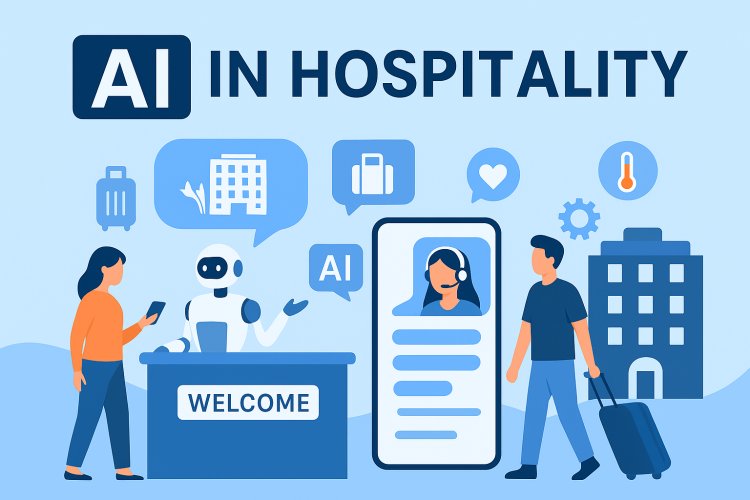AI in Hospitality: Transforming Hotels, Resorts, and Travel in 2025
Discover how AI is revolutionizing the hospitality industry in 2025. Explore AI-driven solutions for hotels, resorts, restaurants, and travel businesses that improve guest experience, streamline operations, and boost revenue.

The hospitality industry has always been centered on delivering unforgettable guest experiences. With the rise of artificial intelligence (AI), hotels, resorts, restaurants, and travel businesses are reinventing how they serve customers in 2025. From AI-powered chatbots that handle bookings to advanced analytics that predict guest preferences, AI is becoming the backbone of modern hospitality.
In this article, we’ll explore the impact of AI in hospitality, its benefits, practical applications, challenges, and the future of AI-driven guest experiences.
Why AI Matters in Hospitality?
Hospitality thrives on personalization and efficiency. Guests expect quick service, tailored recommendations, and seamless booking experiences. Traditional systems often struggle with high guest volume, workforce shortages, and rising costs.
This is where AI steps in:
-
Automation reduces operational burden.
-
Personalization improves guest satisfaction.
-
Predictive analytics increases revenue opportunities.
-
AI chatbots ensure 24/7 customer engagement.
Key Applications of AI in Hospitality
Here are the most impactful AI applications in the hospitality industry in 2025:
| AI Application | Use Case in Hospitality | Benefits |
|---|---|---|
| AI Chatbots & Virtual Assistants | Handle bookings, FAQs, and check-ins | 24/7 support, reduced staff workload |
| Personalized Guest Recommendations | Suggest rooms, meals, activities | Higher guest satisfaction, upselling |
| Revenue Management Tools | Dynamic pricing based on demand | Optimized occupancy & profits |
| AI-Powered Housekeeping | Smart scheduling & cleaning robots | Efficiency and reduced costs |
| Facial Recognition | Contactless check-in & security | Faster, secure, hygienic experience |
| Voice Assistants in Rooms | Control lights, AC, TV | Enhanced guest comfort |
| AI in Food & Beverage | Predict demand, reduce food waste | Cost savings & sustainability |
| Sentiment Analysis | Monitor guest reviews and feedback | Quick service recovery |
Benefits of AI in the Hospitality Industry!
1. Enhanced Guest Experience
AI enables hotels to predict guest needs even before check-in. For example, if a repeat customer prefers a specific type of room or cuisine, AI systems recommend these options automatically.
2. Operational Efficiency
From smart housekeeping schedules to automated inventory management, AI cuts down on manual tasks and labor costs.
3. Revenue Optimization
Dynamic pricing tools powered by AI adjust room rates in real time depending on demand, seasons, or local events.
4. Data-Driven Decisions
AI analyzes customer data to guide marketing campaigns, predict peak seasons, and identify service gaps.
5. Sustainability
AI minimizes food waste in restaurants and reduces energy consumption in hotels, aligning with eco-friendly hospitality trends.
AI in Different Sectors of Hospitality
Hotels & Resorts
Hotels use AI for seamless check-in, keyless room entry, and smart room assistants. Resorts integrate AI to design personalized vacation itineraries.
Restaurants
AI-driven robots prepare food, while recommendation engines suggest personalized menus. AI also predicts demand to manage inventory efficiently.
Travel & Tourism
Travel agencies use AI chatbots for instant travel planning, while AI helps airlines and tour operators enhance customer service.
Challenges of Implementing AI in Hospitality
-
High Initial Investment – Installing AI systems requires upfront costs.
-
Data Privacy Concerns – Guest information must be securely managed.
-
Staff Adaptability – Employees need training to work alongside AI.
-
Over-Reliance on Technology – Too much automation can reduce the “human touch.”
Future of AI in Hospitality
By 2030, AI will likely become a standard feature across hotels, resorts, and restaurants. AI-driven robotics will handle repetitive tasks, while personalization engines will ensure guests feel valued. Hospitality businesses that invest in AI today will gain a competitive advantage in tomorrow’s market.
Conclusion
AI in hospitality is no longer a futuristic concept—it is reshaping guest experiences in 2025. Hotels, resorts, and restaurants that embrace AI will not only improve customer satisfaction but also optimize operations and revenue.
As guest expectations evolve, the real competitive edge lies in blending AI innovation with human hospitality.
Frequently Asked Questions (FAQs)
Q1. How is AI used in hotels?
AI in hotels is used for chatbots, automated check-ins, dynamic pricing, and personalized guest recommendations.
Q2. Can AI replace hospitality staff?
AI can automate repetitive tasks but cannot replace the human warmth and empathy needed in hospitality. Instead, it supports staff in delivering better service.
Q3. How does AI improve guest satisfaction?
AI anticipates guest preferences, offers tailored recommendations, and ensures quick responses, leading to a more enjoyable experience.
Q4. Is AI affordable for small hotels or restaurants?
Yes, many cloud-based AI solutions are budget-friendly and scalable, making them accessible even for small businesses.
Q5. What is the future of AI in the hospitality industry?
The future includes AI-driven robots, more personalized experiences, predictive analytics for demand forecasting, and fully automated operations.


































